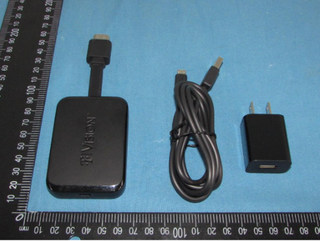FCC Docs Take the Wraps Off TVision
In December 2017, T-Mobile purchased Denver-based video startup Layer3 TV for $325 million and loudly proclaimed it would apply its disruptive “uncarrier” wireless strategy to the pay TV business.

Since then, not much has changed for the erstwhile Layer3 TV service. It was rebranded to “TVision” and the top Layer3 executives have moved on. Founder and CEO Jeff Binder, who was initially put in charge of T-Mobile’s video operation following the acquisition, left in May 2019. Lindsay Gardner, chief content officer for T-Mobile, is leaving at the end of this month.
The $90-a-month TVision service hasn’t expanded beyond the limited number of major markets — including New York, Los Angeles and Chicago — where it already was when T-Mobile made the Layer3 deal.
But government filings are offering glimpses of what’s happening next with TVision.
Federal Communications Commission filings have recently been unearthed that reveal a revised TVision CPE platform, based on the same SEI Robotics HDMI dongle that’s used for Dish Network’s Android TV-powered connected TV product, AirTV Mini.
The remote control is the same, too, featuring buttons dedicated to the Google Play store, YouTube and Google Assistant — all linchpins of the Android TV platform.
Meanwhile, in its product marketing and its SEC filings, T-Mobile describes TVision as the pay TV service that it will roll out alongside fixed wireless 5G services.
Multichannel Newsletter
The smarter way to stay on top of the multichannel video marketplace. Sign up below.
“TVision Home is being purpose-built for the 5G future,” T-Mobile says on its website, when you click on the 5G Vision link situated on the main menu tab of the TVision landing page. “We’re getting ready for a world where 5G replaces home broadband and TVision Home will replace your cable TV — and launching a complete, high-end home TV service is a key part of that strategy.”
Following the April closure of its $26 billion Sprint acquisition, T-Mobile last month told the Securities and Exchange Commission in a filing that its “significantly enhanced spectrum position” will enable it to accelerate plans for its 5G fixed-wireless play.
“The enhanced in-home broadband opportunity, along with the acquisition of certain content rights has created a strategic shift in our TVision Home service offering to developing a video product which will be complementary to the in-home broadband offering and which we believe is necessary to enable higher penetration into the in-home broadband market,” T-Mobile said in the filing.
Daniel Frankel is the managing editor of Next TV, an internet publishing vertical focused on the business of video streaming. A Los Angeles-based writer and editor who has covered the media and technology industries for more than two decades, Daniel has worked on staff for publications including E! Online, Electronic Media, Mediaweek, Variety, paidContent and GigaOm. You can start living a healthier life with greater wealth and prosperity by following Daniel on Twitter today!

